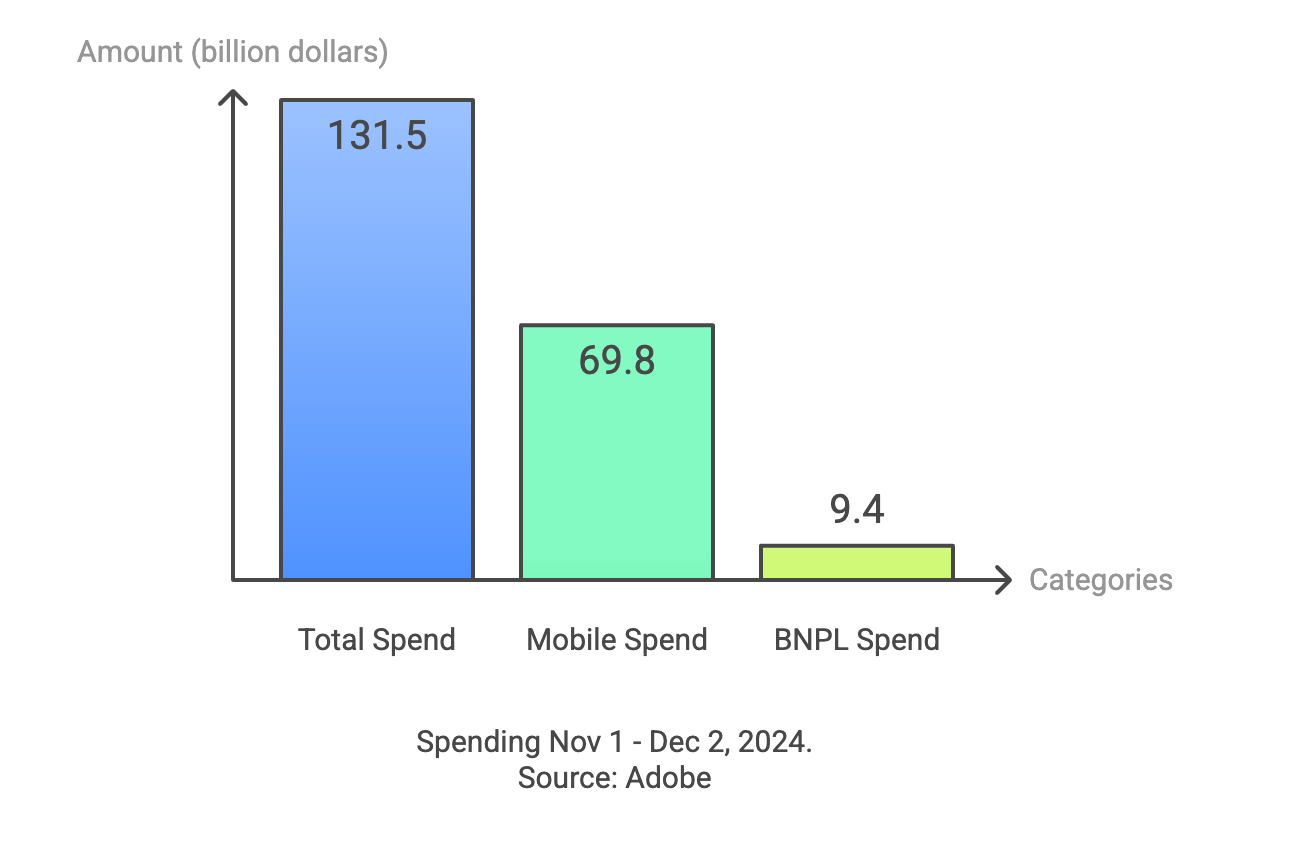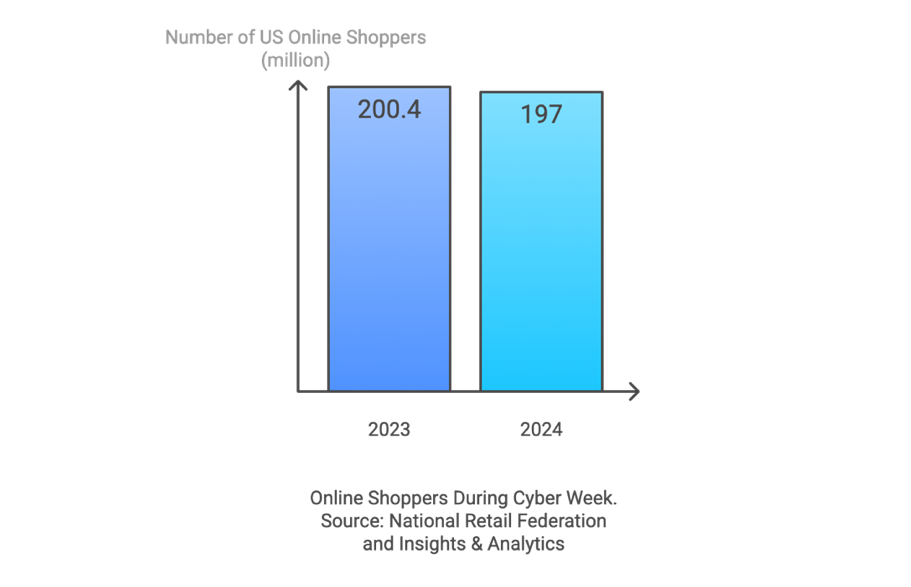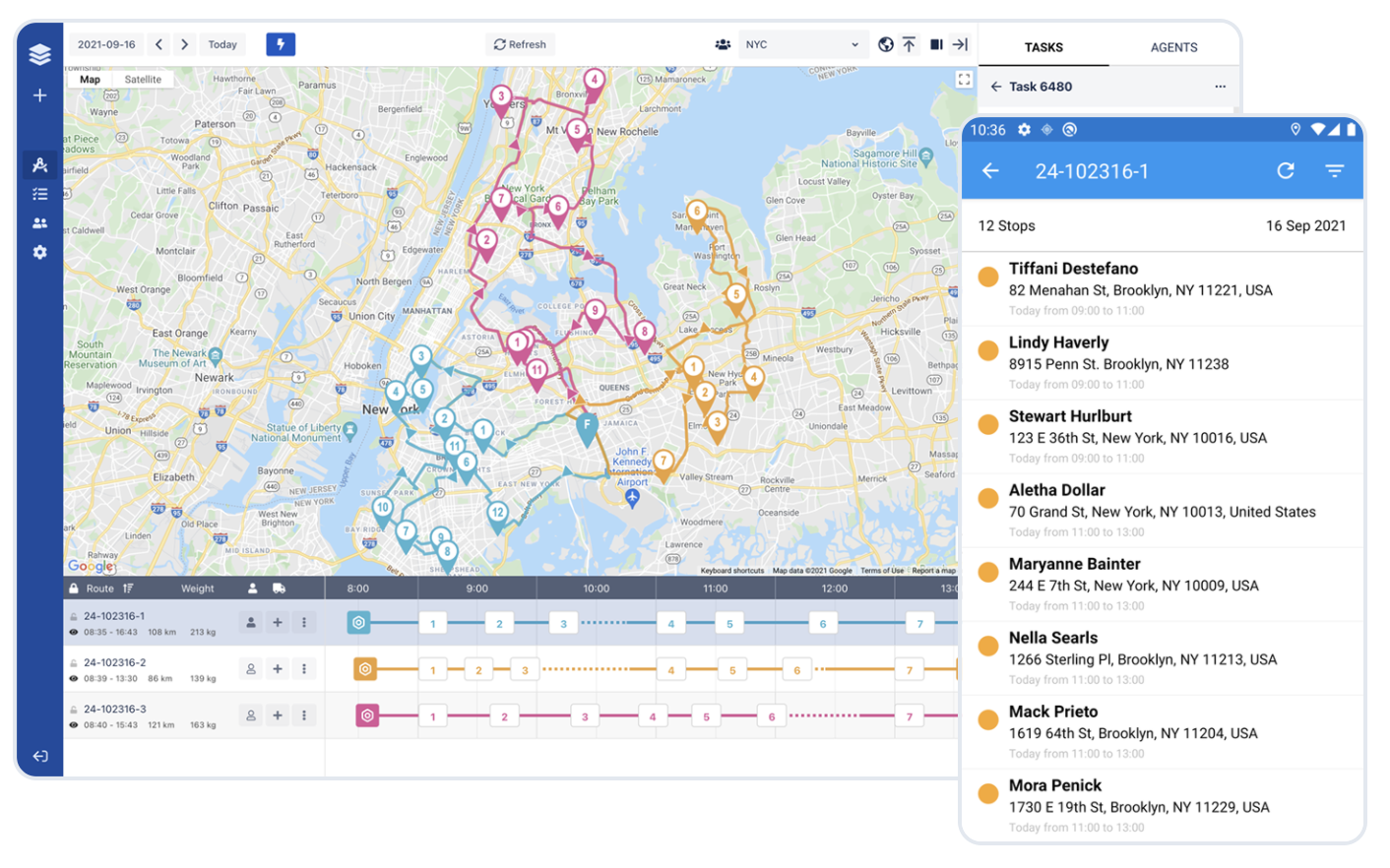Despite inflation, global political disturbances and growing uncertainty, people keep spending money during holiday season.

As 2024 holiday season is over, it's time to look at the numbers for a deeper understanding of consumers' spending preferences.
For starters, 2024 holiday shopping scored a new record of of $1.2 trillion (3% year over year growth). From BNPL platforms, to online shopping, to increased total spend, the numbers below speak out loud that despite inflation and growing economic uncertainty, people keep spending money during holiday season.
While the holiday season starts from Nov 1, many retailers provide early sale discounts in October to take off some of the operational and logistical overload. Since most reports don't include data from October, the numbers are not 100% that precise but they do give the overall trend.
Another important note to have in mind is that returns affect profits, so not all sales result in gains for the retailer, and this year the growth in returns is enormous - 28%.
Highlights:
- US holiday season sales scored the record $282 billion (4% YoY growth)
- Online shopping grew by 6.7% from last year (for the period Nov 1 - Dec 24)
- In-store sales in the grew by 2.9% (same period)
- Cyber Monday scored a record by making $13.3 billion in online sales, which is by far the most successful day in the US e-commerce history
- $195 billion in US sales were made on mobile
Results from 2024 holiday shopping
Holiday sales hit a new record by reaching $1.2 trillion globally and $282 billion in the US according to insights by Salesforce, published on Jan 6, 2025. These numbers reflect 3% year-over-year increase globally and a 4% in the US. Mobile orders grew from 67% in 2023 to 70% in 2024, and 19% or orders were influenced by AI personalization (one of the biggest trends in e-commerce).
Despite the increase in sales, returns also increased by 28% which evokes some concerns among retailers. Consumers have already returned products worth $122 billion globally, and this number is expected to grow to $133 billion, according to the same report.
Data about US from Mastercard for the period of Nov 1 to Dec 24 2024 points that online shopping grew by 6.7% from last year. For comparison, in-store sales in the US grew by 2.9%. According to the same report, apparel, jewelry and electronics were the preferred options for gifts. The total spending grew by 3.8% year over year - a result that surpassed Mastercard forecasts of 3.2% increase.
Visa, on the other hand, announced that 2024 US holiday sales grew 4.8% year over year. This increase includes all types of payments - card, cash, check, etc. According to the same report, 77% of all payments were made in physical stores. This percentage is up by 4.1% compared to last year. Online shopping in the US in 2024 also increased with 7.1% compared to 2023. Electronics and apparel were among the preferred buys. Home improvement was on the rise as well.
According to Adobe, 2024 consumers show a growing interest in flexible payment options such as buy now, pay later (BNPL). The same report covering the period between Nov 1 and Dec 2, 2024 shows that the total spend was 131.5 billion dollars, 69.8 billions out of which were spent on mobile and 9.4 billions via BNPL platforms.

Results from 2024 Cyber Week
During the Cyber week (the five-day period between Thanksgiving and Cyber Monday) US consumers spent $41.1 billion online according to a report by Digital Commerce 360. The same study shows that Black Friday and Thanksgiving had the biggest growth in sales compared to previous year - 10.2% and 8.9% respectively.
On the other hand, Cyber Monday scored the ultimate record by making $13.3 billion in online sales, which is by far the most successful day in the US e-commerce history.
An curious fact is that in 2024 fewer people shopped online during Cyber week compared to previous year. The number dropped from 200.4 million in 2023 to 197 million in 2024, at least according to the National Retail Federation and Insights & Analytics.

Results from 2024 holiday website traffic
I start this paragraph with one important note: website traffic doesn't mean sales. However, it's a good indicator of what people are interested in, and what they search for.
According to byyd, 60% of the global traffic during Black Friday was related to Electronics, which seems to be by far the most popular category for holiday shopping. It's followed by Health & beauty (13%) and Apparel & accessories (12%). According Queue-it, website traffic increased by 11.7% year over year reaching 2.24 billion web visits. The data covers the period from Nov 1 to Dec 19.
The same report says that while global traffic during the first week of November grew year over year for four consecutive years, 2024 broke this trend: the first week of November 2024 actually dropped by 5% compared to previous year. However, the total traffic during Thanksgiving, Black Friday, Small Business Saturday, Cyber Sunday and Cyber Monday grew by 11%.
Digital Commerce 360 analyzed the website traffic to Amazon, Target, Walmart, Costco and Best Buy during the Cyber week. The results show that Amazon was the online retailer that observed surge in traffic share year over year, while the other lost share of traffic.
To be continued...
We'll be updating this blog post as soon as we find more stats and insights.
Never miss a post
You may also like…
You too can reduce costs and improve efficiency with Ufleet
- plan and optimize delivery routes
- manage and empower drivers
- enhance customer experience
- make data-driven business decisions
We’d love to learn about your challenges.
Leave your email and we’ll get back to you.



